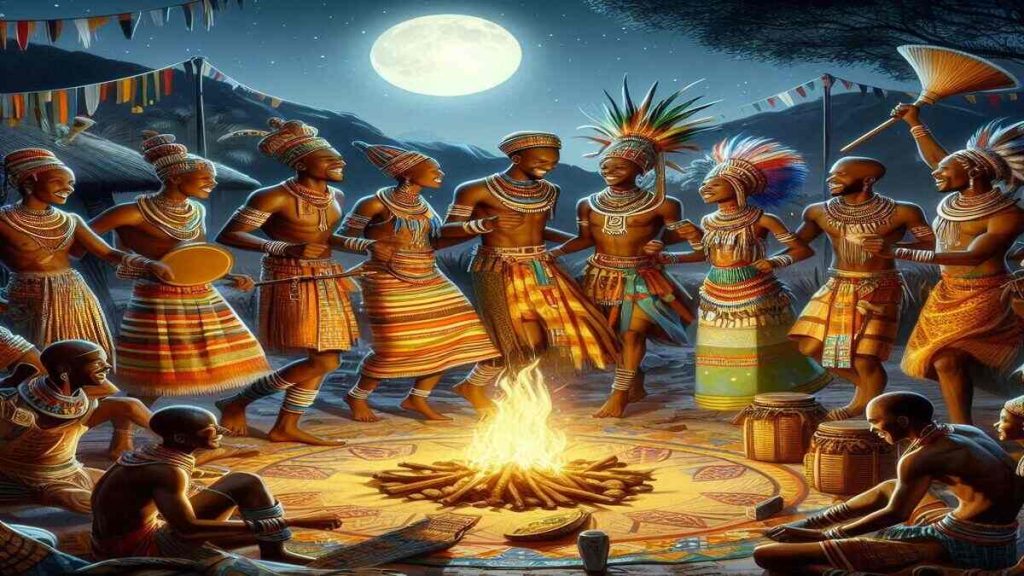Africa is home to a vast array of cultures, each with its own unique traditions and customs. Some of these practices can seem unusual—or even downright weird—when viewed from the outside. But like with many traditions, there’s often a deep cultural or historical significance behind them. Let’s dive into some of Africa’s most fascinating and, yes, weird traditions that might leave you both amazed and curious.
8 Weird Traditions You Can Only Find in Africa
1. The Lip Plates of the Mursi Tribe (Ethiopia)
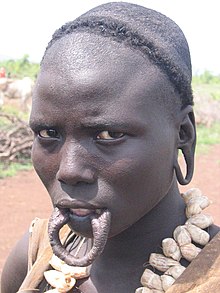
Among the Mursi tribe in Ethiopia, women wear large lip plates as a symbol of beauty and status. This practice might seem extreme, but it holds great cultural significance for the Mursi people. Girls start by piercing their lower lips around the age of 15 or 16, inserting a small wooden peg. Over time, they replace the peg with larger and larger clay or wooden plates, gradually stretching the lip.
The size of the plate can indicate a woman’s social standing and can also be associated with her bride price, the amount of cattle that a suitor must offer her family in exchange for marriage. Interestingly, the tradition is not imposed on every woman—it’s often a choice, and the lip plates are worn with a sense of pride.
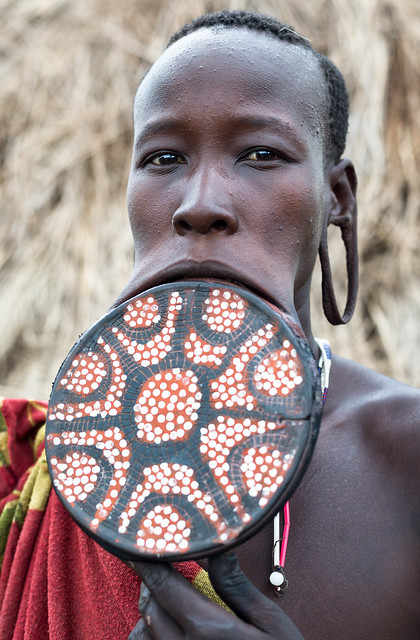
From the outside, it might seem painful or uncomfortable, but for the Mursi, it’s a long-held tradition tied to identity, beauty, and strength.
2. The Bull-Jumping Rite of Passage (Hamar Tribe, Ethiopia)
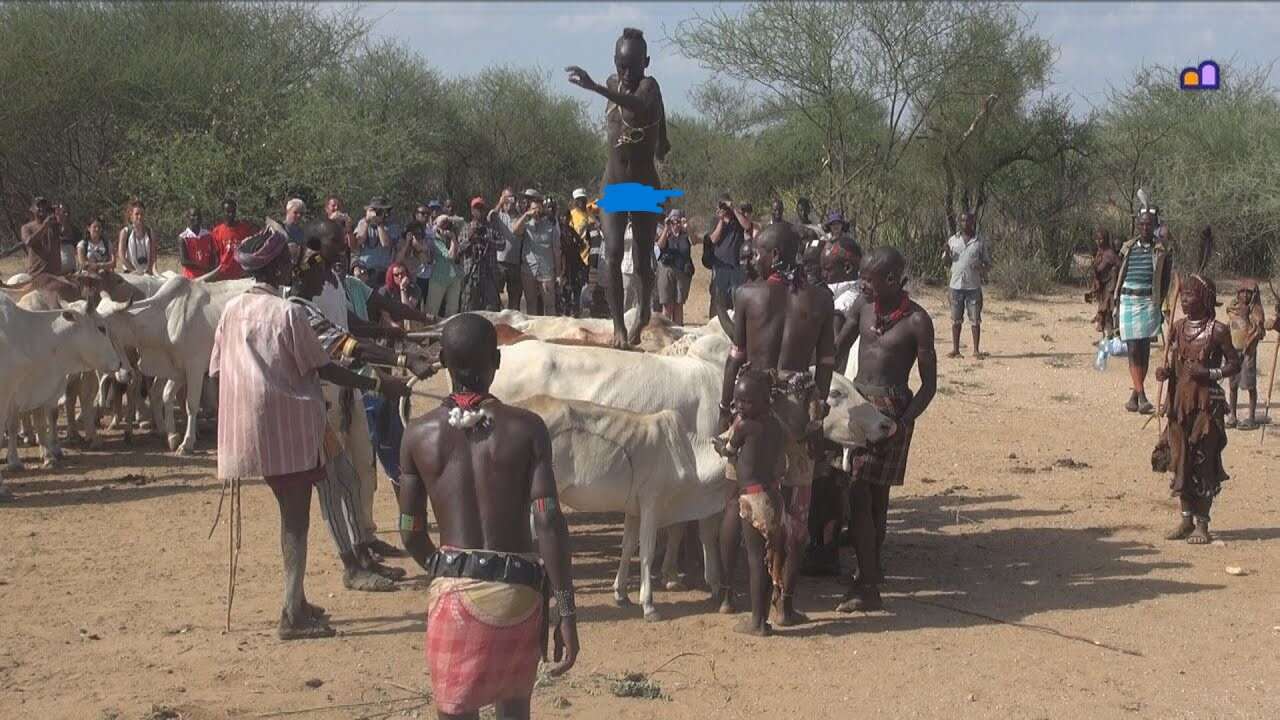
Another fascinating tradition from Ethiopia comes from the Hamar tribe, where young men prove their readiness for adulthood through a bull-jumping ceremony known as Ukuli Bula. The stakes? High. The ritual signifies the young man’s transition into adulthood, after which he can marry and begin a family.
The event is a communal affair, with the tribe gathering to watch. In the lead-up to the jump, female relatives of the initiate sing and dance, showing their support—and sometimes even undergoing ritual whippings to demonstrate their loyalty and strength. Then comes the main event: the initiate must leap over the backs of several bulls, which are lined up side by side. He must complete this task several times, often without clothes, to show that he is strong and capable.
For the Hamar, this ceremony is not just about physical strength—it’s also about endurance, courage, and family bonds. Jumping over a row of bulls might sound terrifying to outsiders, but it’s also a defining moment for young men in the Hamar community. Read more about it.
3. Spitting as a Sign of Respect (Maasai Tribe, Kenya and Tanzania)
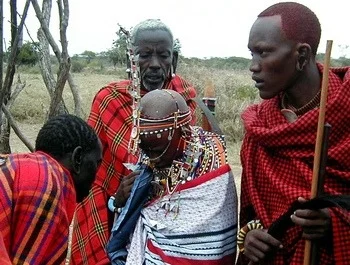
Among the Maasai people of Kenya and Tanzania, spitting is a sign of respect and blessing. While in many cultures, spitting is seen as rude or offensive, among the Maasai, it’s a way to express goodwill and honor.
For example, when Maasai elders greet each other, they spit in their hands before shaking. And when a father meets his newborn child for the first time, he will spit on the baby to bring good luck. This might seem odd to us, but in Maasai culture, it’s a sincere form of blessing. Even when someone gives a gift or shows appreciation, they might spit on the item or the person they’re honoring to wish them success and happiness.
The practice of spitting is woven into the fabric of Maasai culture, showing that respect and blessing can take many forms, even if they seem strange at first glance.
4. The Turning of the Bones (Famadihana, Madagascar)
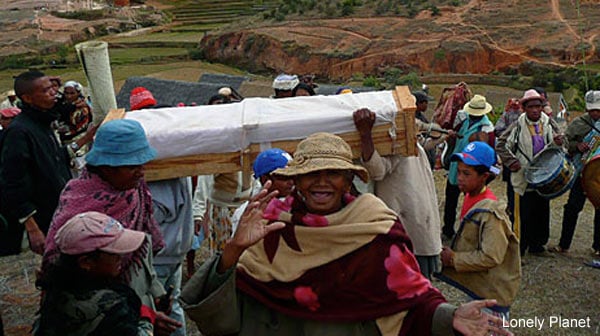
Perhaps one of the most unusual funeral customs in Africa is the Famadihana, or “turning of the bones,” practiced by the Malagasy people of Madagascar. Every five to seven years, families dig up the remains of their ancestors, rewrap them in fresh cloth, and dance with the corpses before reburying them.
Why do they do this? For the Malagasy, the Famadihana is a celebration of life and a way to honor their ancestors. It’s believed that the dead only truly join the afterlife once their bodies have fully decomposed, so by rewrapping the bones, the living keep the spirits of their ancestors close until they are ready to pass on completely. The festival is a lively event, filled with music, dancing, and storytelling, as families reconnect with the spirits of the deceased.
While this tradition might seem morbid to outsiders, for the Malagasy, it’s a joyous occasion that strengthens family ties and keeps the memory of loved ones alive.
5. The Gerewol Festival and Men’s Beauty Contests (Wodaabe Tribe, Niger)
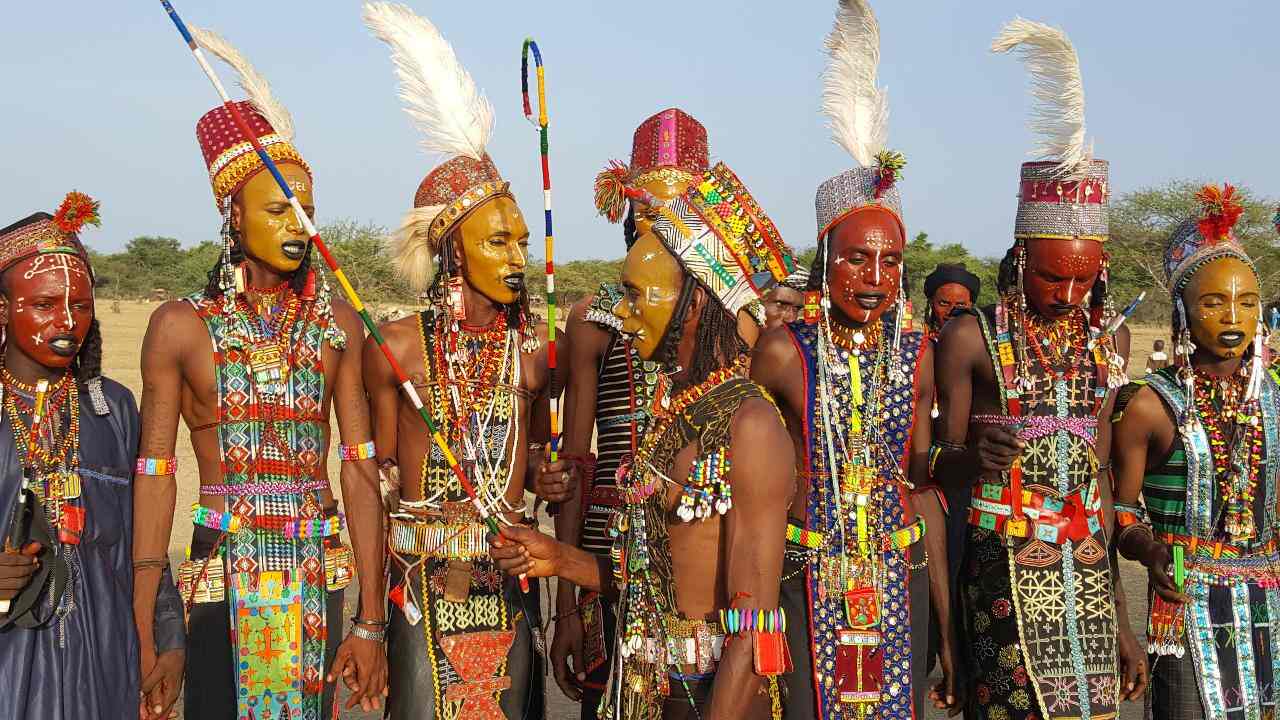
Beauty contests aren’t just for women—at least not in the Wodaabe tribe of Niger. Each year, Wodaabe men take part in the Gerewol festival, a traditional beauty pageant where men compete for the attention of women. But it’s not just about good looks. The men adorn themselves in elaborate face paint, wear decorative beads and feathers, and perform a series of dances meant to showcase their charm and charisma.
During the festival, men highlight their facial features with intricate patterns, using bold colors like white, red, and yellow to make their eyes and teeth stand out. The women, who serve as judges, are looking for specific traits—wide eyes, white teeth, and tall, lean physiques are considered ideal.
The festival is more than just a contest of appearances; it’s also an opportunity for men to find love, as the women whether married or not, may select partners based on their performances. The competition is fierce, but it’s all done in the spirit of fun and celebration.
6. The Dogon Mask Dances (Mali)
The Dogon people of Mali are famous for their elaborate mask dances, which are performed during funeral rites and other important ceremonies. These dances are not only a form of artistic expression but also a deeply spiritual practice, believed to help guide the souls of the deceased to the afterlife.
The masks themselves are incredibly intricate, often representing different animals, spirits, or ancestors. Some masks are towering and can be several feet tall, requiring incredible skill and balance to wear during the dance. The dancers move in rhythmic, acrobatic patterns, often accompanied by drums and chanting, creating a mesmerizing and powerful spectacle.
For the Dogon, these dances are a way to honor the dead and celebrate the continuity of life. While the sight of people wearing towering masks and performing complex dances might seem strange to outsiders, the tradition holds deep cultural and spiritual meaning for the Dogon community.
7. The Chewa Cleansing Ritual of the Dead (Malawi)
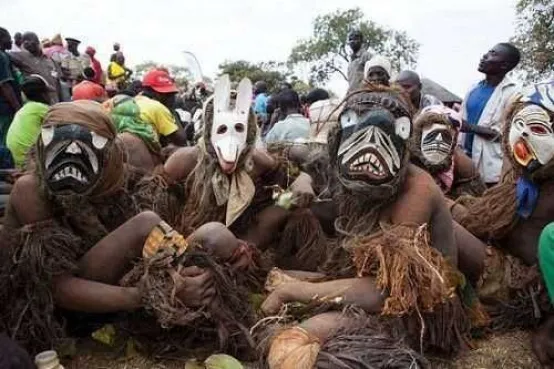
The Chewa people of Malawi, a Bantu-speaking community, have a distinctive funeral ritual involving the cleansing of the deceased. When a tribe member dies, the body is taken to a sacred place, where a purification ritual is performed. The body is cleansed by slitting the throat and pouring water into the corpse, allowing the water to pass through the body and exit through the lower region. This water, believed to have purified the deceased, is then used to prepare a meal for the entire community. The Chewa believe that this practice cleanses the deceased of their iniquities, ensuring a proper transition into the afterlife.
However, this tradition has also been linked to health risks. The use of water that has passed through the body of the deceased has been reported to contribute to the spread of infectious diseases within the community.
Another key aspect of Chewa funerals is the belief that death is often caused by witchcraft rather than natural causes. Because the Chewa believe that witchcraft primarily affects family members, those responsible for the death might avoid attending the funeral. To prevent this, it is customary for all family members—and by extension, the entire village, as they are often related—to attend the funeral, ensuring that no one is singled out or suspected of wrongdoing.
8 The Oro Festival (Nigeria)

The Oro Festival, practiced by the Yoruba people in southwestern Nigeria, is one of the most secretive and mysterious traditions on the continent. The festival is dedicated to the Oro deity, and only initiated men are allowed to participate in or witness the rituals. During the festival, women and uninitiated men are strictly forbidden from coming outside or witnessing certain ceremonies, as it’s believed that doing so could bring bad luck or even death.
The Oro spirit is often represented by eerie sounds made through special whistling instruments, which fill the air during the nights of the festival. These sounds, coupled with the secrecy surrounding the rituals, make the Oro Festival a particularly unique and strange tradition to outsiders. The festival embodies the Yoruba belief in the power of the spirit world and the importance of maintaining strict cultural boundaries between the seen and unseen realms.
Conclusion: The Beauty Behind the “Weird”
At first glance, these traditions may seem strange or even bizarre to those unfamiliar with them. But when you take a closer look, they reveal the rich diversity and cultural significance that make Africa such a fascinating continent. Whether it’s the lip plates of the Mursi, the bull-jumping of the Hamar, or the ancestor worship of the Malagasy, each of these customs plays an important role in the lives of the people who practice them.
So the next time you come across a tradition that seems “weird,” remember that behind every custom, there’s a story, a history, and a deep connection to the people’s way of life.
